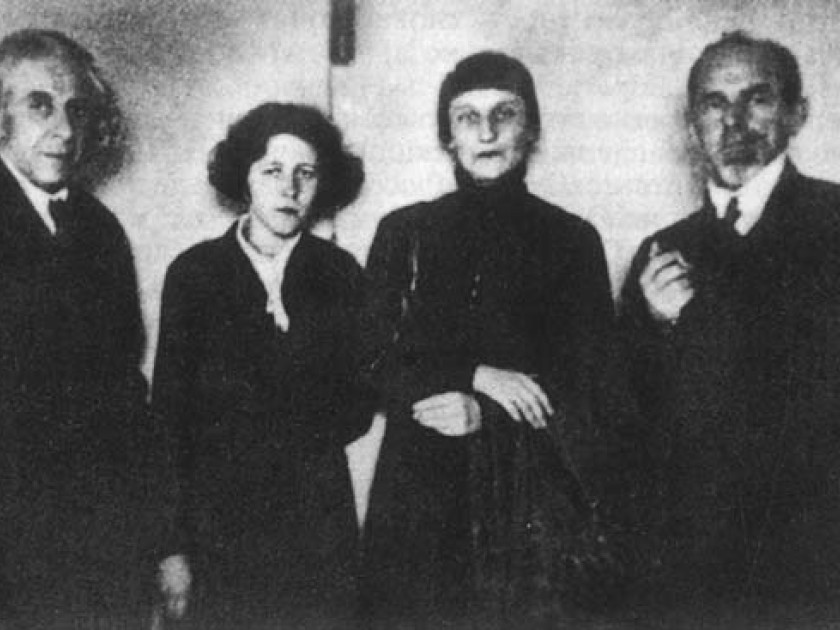
From left to right: Georgy Chulkov, Mariya Petrovykh, Anna Akhmatova, Osip Mandelstam
Growing up as a Russian immigrant in Boston, I memorized a lot of poetry. It was a common practice in the Soviet Union, part of all school curriculums, and my parents wanted to pass it on to me even though they were raising me in the US. In exchange for spoonfuls of sweet condensed milk, I would recite Osip Mandelstam, Anna Akhmatova, and others; and decades later, I can still recall the rhythms, the musical patterns of the language, and some of the lines.
I was not someone who always wanted to be a writer. I was interested in the visual arts and had a good eye, but I was not a natural storyteller. It was only when I got to college that a friend convinced me to take a writing class with him. I was studying photography and feeling frustrated by the process — I was too shy to photograph strangers, and the kind of elaborate photos I set up were cumbersome and complicated. In the writing class, I could just make things up! I didn’t need anybody’s permission or to coordinate with anyone else’s schedule. The first things I wrote were poems — they weren’t musical in their language like the Russian poems I grew up reading, but they were prose poems that depicted arresting and unsettling moments. It took me a while, but I slowly figured out how to string these images together until they formed scenes, stories, and then eventually books.
For my most recent novel, Mother Doll, I drew on my life as a Soviet immigrant. Like me, my main character, Zhenia, grew up in Boston and then moved to Los Angeles and raised a child there. Unlike me, Zhenia finds herself conversing via a psychic medium with her dead great-grandmother, Irina, a Russian Jewish revolutionary. In order to create Irina’s character, I read widely about the Russian Revolution and took inspiration from the lives of several poets from that time period, especially ones whose work I memorized as a child.
In exchange for spoonfuls of sweet condensed milk, I would recite Osip Mandelstam, Anna Akhmatova, and others; and decades later, I can still recall the rhythms, the musical patterns of the language, and some of the lines.
Much like Irina in Mother Doll, Osip Mandelstam was Jewish and living in St. Petersburg during the Revolution. At that time, Jews in Russia were mostly confined to certain geographical regions — but a scant few, most of whom belonged to the merchant class, were given papers to live in major cities. Mandelstam grew up more privileged than most, as the son of leather merchants. He studied in the Sorbonne in France and at the University of Heidelberg in Germany, and then at the University of St. Petersburg. The latter institution was not open to Jewish students at the time, but Mandelstam was somehow granted admission.
Also like Irina, Mandelstam was a supporter of the Revolution until he wasn’t. After the Bolsheviks seized power, there was a lot of pressure put on him to write propagandist poems that praised the new order. His poems were deeply personal and humanistic, and he was not interested in writing propaganda. His work often emphasized the individual over the collective, which made him a problem for the censors. In 1933, he wrote a poem that was critical of Stalin, and for this he was arrested, tortured, and exiled out of the city to a small village in the Ural Mountains. He tried to return to Moscow, and he was arrested again in 1937. He then disappeared into the labor camps where he died.
Many of the poets and artists from this time period had once been supportive of and excited by the Revolution. They were drawn to its energy and zeal, to the promise of a life more just than the one they had lived under the tsar. Most of these people were disappointed. Some escaped, immigrating to France and elsewhere. Others were driven underground, and many more were killed.
Mother Doll draws on Mandelstam’s biography and even features a character named in his honor. As a child, I would try to picture what it would be like to be brave like Mandelstam was, standing up to injustice and writing poems about a dictator who would surely seek retribution. I also thought about what it would be like to be so attuned and true to one’s art that writing was the only way forward, the only way through.
Katya Apekina is a novelist, screenwriter, and translator. Her debut novel, The Deeper the Water, the Uglier the Fish, was named a Best Book of 2018 by Kirkus, Buzzfeed, Lithub, and others, was a finalist for The LA Times Book Prize, and has been translated into Spanish, Catalan, French, German, and Italian. She is the recipient of an Elizabeth George grant, an Olin Fellowship, the Alena Wilson prize, and a Third Year Fiction Fellowship from Washington University in St. Louis, where she did her MFA. She has done residences at VCCA, Playa, Ucross, Art Omi: Writing, and Fondation Jan Michalski in Switzerland. Born in Moscow, she moved to the US when she was three years old and currently lives in Los Angeles, California. Mother Doll is her second novel.